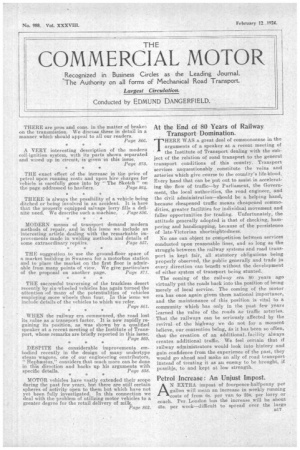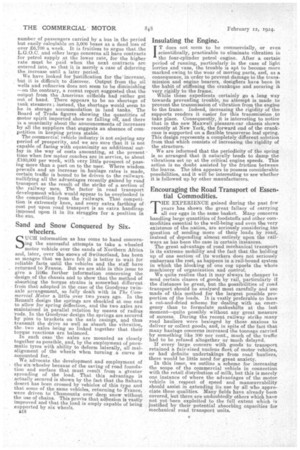At the End of 80 Years of Railway. Transport Domination.
Page 1

Page 2

If you've noticed an error in this article please click here to report it so we can fix it.
HERE WAS a great deal of commonsense in the arguments of a speaker at a recent meeting of the Institute of Transport dealing with the subject of the relation of road transport to the general transport conditions of this country. Transport services unquestionably constitute the veins and arteries which give course to the country's life-blood. Every hand that can be put out to assist in accelerating the flow of traffic—by Parliament, the Government, the local authorities, the road engineer, and the civil administration—should be a helping hand, because cheapened traffic means cheapened commodities, greater facilities for individual movement and fuller opportunities for trading. Unfortunately, the attitude generally adapted is that of checking, hampering and handicapping, because of the persistence of late-Victorian shortsightedness.
No one can object to competition between services conducted upon reasonable lines, and so long as the struggle between the railway systems and road transport is kept fair, all statutory obligations being properly observed, the public generally and trade in every direction can benefit without the development of either system of transport being stunted.
The coming of the railway era 80 years ago virtually put the roads back into the position of being merely of local service. The coming of the motor era has once again given them national importance, and the maintenance of this position is vital to a community which has only in the past few years learned the value of the roads astraffic arteries. That the railways can be seriously affected by the revival of the highway we do not for a moment believe, our contention being, 5:s it has been so often, that the 'creation of an additional. facility always creates additional traffic. We feel certain that if railway administrators would look into history and gain confidence from the experience of the past, they would go ahead and make an ally of road transport instead of treating it as an enemy to be brought, if possible, to and kept at low strength.
Petrol Increase : An Unjust Impost.
AN EXTRA impost of fourpence-halfpenny per gallon will mean an increase in weekly running -costs of from 6s. per van to 25s. per lorry or• coach. Per. Landon bus the increase will be about 46s. per week—difficult to spread over the large
number of passengers carried by a bus in the period but easily calculable on 3,000 buses as a dead loss of over £6,700 a week. It is fruitless to argue that the L.G.O.C. and other large concerns all have contracts for petrol supply at the lower rate, for the higher rate must be paid. when the next contracts are entered into, so that it is merely a case of deferring the increase until a later period. We have looked for lustification for the' increase, but it is difficult to discover. Output from the oil wells and refineries does not seem to be diminishing —on the contrary, a recent report suggested that the output from the American oilfields had rather got out of hand. There appears to be no shortage of tank steamers ;instead, the shortage would seem to be in storage accommodation in land tanks. The Board of Trade figures showing the quantities of motor spirit imported show no falling off, and there is a unanimity about the announcements of increases by all the suppliers that suggests an absence of competition in keeping prices stable. The commercial vehicle industry is not enjoying any period of prosperity, and we are sure that it is not capable of facing with equanimity an additional outlay in the way of costs amounting, at the present time when few motor coaches are in service, to about £100,000 per week, with very little prospect of passing more than a part on to the user. Where wisdom prevails and an Increase in haulage rates is made, certain traffic is bound to be driven to the railways. nullifying all the advantages recently gained by road transport as the result of the strike of a section of the railway men. The factor in road transport development which would appear to be overlooked is the competition from the railways. That competition is extremely keen, and every extra farthing of cost put upon road transport is an extra handicap imposed upon it in its struggles for a position in the sun.
Sand and Snow Conquered by Six. wheelers.
SUCH information as has come to hand concerning the successful attempts to take a wheeled motor vehicle over the sands of Northern Africa and, later, over the snows of Switzerland, has been so meagre that we have felt it is better to wait for reliable facts until the vehicles and the staff have , returned to France. But we are able in this issue to give a little further information concerning the design of the chassis and to show that the method of absorbing the torque strains is somewhat different from that adopted in the case of the Goodyear twinaxle arrangement, so fully dealt with in The Commercial Motor a little over two years ago. In the Renault design the springs are shackled at one end to allow for spring deflection, and the two axles are maintained in parallel relation by means of radius rods. In the Goodyear design the springs are secured )3y pins to brackets on the axle casings, and thus transmit the drive as well as absorb the vibration, the two axles being so linked together that their torque reactions are balanced.
In each case 'the axles are mounted as closely together as possible, and, by the employment of pneumatic tyres with ability to deform laterally, all realalignment of the wheels when turning a curve is accounted for.
We advocate the development and employment of . the six-wheeler because of the saving of road foundation and surface that must result from a greater spreading of the load. That this advantage is actually secured is shown by the fact that the Sahara desert has been crossed by vehicles of this type and that some of the same vehicles, returning to France, were driven to Chamounix over deep snow without the use of chains. This proves that adhesion is vastly Improved and that the load is amply capable of being supported by six wheels. B18
Insulating the Engine.
IT does not seem to be commercially, or even scientifically, practicable to eliminate vibration in the four-cylinder petrol engine. After a certain period of running, particularly in the case of light lorries and vans, the trouble is apt to become more marked owing to the wear of moving parts, and, as a consequence, in order to prevent damage to the transmission and engine bearers, designers have been in the habit of stiffening the crankcase and securing it very rigidly to the frame.
While these expedients certainly go a long way towards preventing trouble, no attempt is made to prevent the transmission of vibration from the engine to the frame. Indeed, increasing the rigidity of the supports renders it easier for this transmission to take place. Consequently, it is interesting to notice that in the new Maxwell pleasure-car chassis shown recently at New York, the forward end of the crankcase is supported on a flexible transverse leaf spring. This design represents a completely different solution from that which consists of increasing the rigidity of the structure.
We are informed that the periodicity of the spring is so arranged that it naturally tends to damp the vibrations set up at the critical engine speeds. This action is no doubt assisted by the friction between the leaves. The idea appears to possess considerable possibilities, and it will be interesting to see whether it is followed up by other manufacturers.
Encouraging the Road Transport of Essential Commodities. Encouraging the Road Transport of Essential Commodities.
THE EXPERIENCE gained during the past few years has shown the great fallacy of carrying all our eggs in the same basket. Many concerns handling large quantities of foodstuffs and other commodities essential to the well-being and even the very existence of the nation, are seriously considering the question of sending more of their loads by road, instead of depending almost entirely upon the railways as has been the case in certain instances.
The great advantage of road mechanical transport is its extreme mobility and the fact that the holding up of one section of its workers does not seriously embarrass the rest, as happens in a rail-bound system in which the blocking of one cog upsets the whole machinery of organization and control.
We quite realize that it may always be cheaper to send certain classes of goods by rail, particularly if the distances be great, but the possibilities of road transport should be analysed most carefully and use made of this method for the largest possible proportion of the loads. It is vastly preferable to have a cut-and-dried scheme for dealing with an emergency than to formulate makeshifts at the last moment—quite possibly without any great measure of success. During the recent railway strike many road hauliers were besieged by those anxious to deliver or collect goods, and, in spite of the fact that many haulage concerns increased the tonnage carried by something like 300 per cent., much of the traffic had to be refused altogether or much delayed.
If every large concern with goods to transport retained a fair-sized nucleus fleet. of motor vehicles, or had definite undertakings from road hauliers, there would be little need for great anxiety. In this issue, we outline a scheme for increasing the scope of the commercial vehicle in connection with the retail distribution of milk, but this is merely one instance of where the advantages of the motor vehicle in respect of speed and manosuvrability should assist in extending its use by all who appreciate these qualities. Many fields have already been covered, but there are undoubtedly others which have not yet been exploited to the full extent which is justified by their potential absorbing capacities for mechanical road transport units.






























